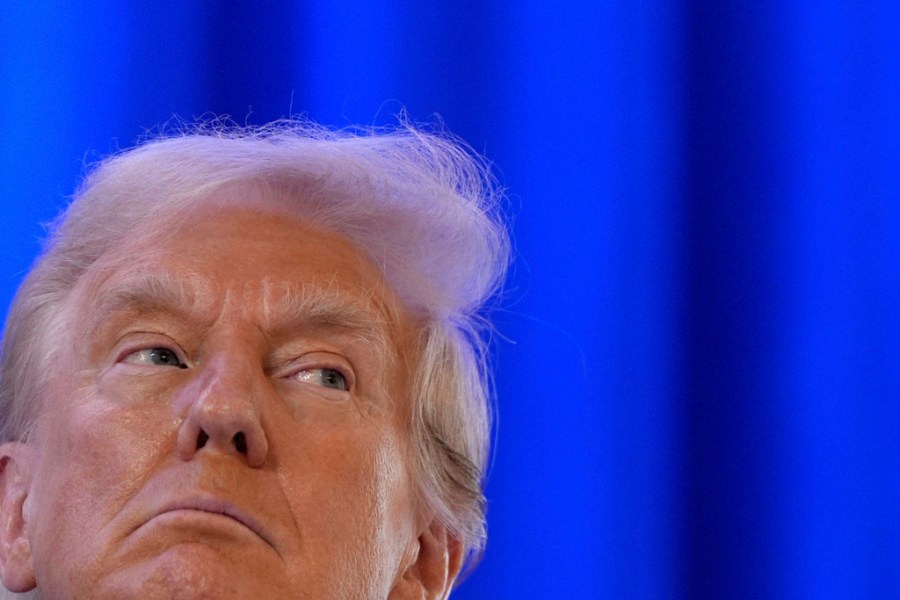
The Trump administration presents a substantially increased risk of the nation’s secrets being compromised. As with many other matters, the pattern is set at the top.
If President Trump were an applicant for an ordinary position in the national security bureaucracy, he would be denied a security clearance. The numerous red flags in his case would lead any security officer reviewing his file to put it in the rejection pile.
These red flags include, among other things, multiple business bankruptcies, financial dependence on foreigners and private dealings with a foreign adversary that Trump has taken pains to keep private. Added to that are character flaws that include behavior he has paid hush money to conceal and his status as a convicted felon.
But as president, Trump gets access to classified information anyway. And although some of his senior appointees might also have trouble getting clearances, Trump can give them access. He has already done that with an order making it possible for anyone in the Executive Office of the President — which potentially includes several hundred people — to receive a Top Secret-Sensitive Compartmented Information clearance immediately, good for six months, with no prior security review.
Trump’s blurring of distinctions between the personal and the official was reflected in his carting off boxloads of classified documents at the end of his first term and resisting their return for more than a year while describing them, contrary to law, as “my” documents.
Trump’s stashing of classified documents in a bathroom and ballroom at Mar-a-Lago was hardly his only misuse of such material. His decision during his first term to reveal highly classified material to the Russian foreign minister and ambassador was apparently motivated by his desire to show off what good stuff he had access to. His motivation to make trouble for his domestic political rivals despite opening information to foreign adversaries was illustrated during the 2016 election campaign when he urged Russia to hack into Hillary Clinton’s email — which the Russians in fact did shortly afterward.
Trump’s attraction to the regime of Russian President Vladimir Putin is highly relevant to the problem of safeguarding U.S. secrets. His animus toward the U.S. intelligence community, motivated in large part by the community addressing Russia’s election interference that helped to elect Trump in 2016, is also relevant, because the community produces much of the most sensitive classified material. A low regard for the intelligence agencies encourages a low regard for the need to safeguard their product.
On this, as on other matters, the example set by Trump will be followed by his appointees.
One way Trump’s director of the Central Intelligence Agency, John Ratcliffe, demonstrated his fealty to Trump during his earlier tenure as director of national intelligence was to declassify and release publicly a Russian document for no apparent purpose, other than that it suggested Clinton was behind any perceived connection between Trump’s campaign and Russia. Ratcliffe made the disclosure notwithstanding any threat to intelligence sources and methods and despite the document’s contents being unverified and possibly Russian disinformation.
The Trump team’s careless approach to safeguarding sensitive information was apparent even before the president’s return to office. His transition team used private email to discuss government business with officials of the outgoing administration — a practice for which Trump in an earlier campaign, had castigated Clinton. Trump’s adviser, Elon Musk, is a security risk on multiple grounds, and Musk’s company SpaceX has a poor record of compliance with procedures designed to safeguard government secrets.
A disdain for protecting the nation’s secrets leads to a permissive posture toward leakers. “I love WikiLeaks,” proclaimed Trump during his 2016 campaign, because among the wholesale disclosures by WikiLeaks of U.S. classified information was material that caused problems for Clinton, his political opponent at the time.
Several influential people in Trump’s circle are urging him to pardon Edward Snowden, the contract employee of the National Security Agency who committed the largest leak ever of top-secret information about the nation’s signals intelligence programs. Trump has said he came close to granting a pardon during his first term.
Snowden’s disclosures went far beyond any controversial domestic activities and included copious material about NSA’s normal mission of collecting foreign intelligence. Who benefitted and who was harmed by Snowden’s actions is demonstrated by his placing himself in the hands of Russia and accepting Russian citizenship. Snowden is a traitor — even though Trump’s nominee to be director of national intelligence, Tulsi Gabbard, refused to acknowledge it at her confirmation hearing.
The main immediate harms of the new administration’s handling of classified information include the loss of intelligence sources and methods, which can include the death of human agents. Foreign adversaries gain valuable knowledge about U.S. intelligence, military and other capabilities. Any compromise of classified material makes foreign partners in critical liaison relationships less willing to share their information with the U.S. — as I saw happen during my intelligence career following earlier leaks.
Trump’s carelessness in handling the nation’s secrets and his encouragement of leakers promotes a further breakdown of discipline in the ranks. That leads to still more leaks and more unauthorized disclosures, which multiplies the harms.
Paul R. Pillar is former national intelligence officer for the Near East and South Asia. His most recent book is “Beyond the Water’s Edge: How Partisanship Corrupts U.S. Foreign Policy.”












